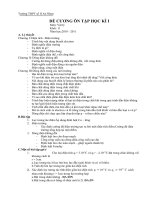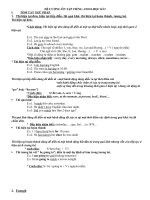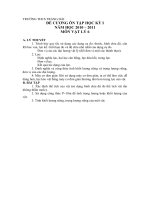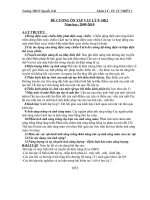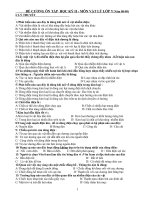De cuong on tap HK IAnh9 ly thuyet bai tap
Bạn đang xem bản rút gọn của tài liệu. Xem và tải ngay bản đầy đủ của tài liệu tại đây (111.39 KB, 6 trang )
<span class='text_page_counter'>(1)</span><div class='page_container' data-page=1>
<b>REVISION FOR ENGLISH 9 </b>
<b>REVISION FOR ENGLISH 9 (THE FIRST SEMESTER)</b>
<b>Part 1. Wish - sentences: S1 + wish + S2 + V past simple.</b>
Ex: I wish I were a teacher.
He wishes he could swim.
They wish they visited Paris.
Lan wishes her mother didn’t go to work everyday.
<b>Part 2. Used to - sentences: S + used to + V.</b>
<b>Part 3. TENSES</b>
<b>Forms</b> <b>Adverbs</b>
<b>1. Hiện tại đơn:</b> <b>S + V(s/es) </b>
He usually eats a big breakfast.
always, usually, often, sometimes,
never, every …
<b>2. Hiện tại tiếp </b>
<b>diễn: </b>
<b>S + am/is/are + Ving </b>
Bill is using a computer now.
now, at the moment, at present, …!
<b>3. Hiện tại hồn </b>
<b>thành:</b>
<b>S + have/has + PP </b>
My father has worked here for 2
<b>years.</b>
since, for, lately, recently, just, before,
all … life, already, yet, never, ever, …
<b>4. Quá khứ đơn:</b> <b>S + Ved/V2 </b>
He bought a car yesterday.
yesterday, last ….., ….ago, in …
* S +V(htht) since S +V(qkđ)
<b>5. Quá khứ tiếp </b>
<b>dieãn:</b>
<b>S + was/were + Ving </b>
I was reading at 9 o’clock
yesterday.
I was reading the letter when she
<b>came.</b>
- at 9 o’clock yesterday
- at this time last night
<b>6. Tương lai đơn</b> <b>S + will + V </b>
I will wash my clothes tonight. tonight, tomorrow, next….., soon, in two hours, …
Part 4. 1. Bị động của các thì:
<b>Phần 3: PASSIVE FORMS</b>
<b>Active->Passive</b> <b>examples</b>
<b>1. Hiện tại đơn:</b> <b>S + V + O.</b>
<b>S’ + am/is/are + PP + by + O.</b>
He eats a big breakfast.
A big breakfast is eaten by him.
<b>2. Hiện tại tiếp </b>
<b>diễn: </b>
<b>S + am/is/are + Ving + O.</b>
<b>S’+ am/is/are + being+ PP + by + O</b>
Bill is using a computer now.
A computer is being used now.
<b>3. Hiện tại hồn </b>
<b>thành:</b>
<b>S + have/has + PP + O.</b>
<b>S’ + have/has + been + PP + O.</b>
My father has repaired the cars.
The cars have been repaired by my father.
<b>4. Quá khứ đơn:</b> <b>S + Ved/V2 + O.</b>
<b>S’ + was/were + PP + by + O.</b>
My family bought a car.
A car was bought by my family.
<b>5. Quá khứ tiếp </b>
<b>dieãn:</b>
<b>S + was/were + Ving + O.</b>
<b>S’ + was/were + being+ PP + by + O.</b>
I was reading the letter when she came.
The letter was being read when she came.
<b>6. Tương lai ñôn, động</b>
<b>từ kh khuyết.</b> <b>S + will + V + O.</b>
<b>S’ + will be + PP+ by + O</b>
I will wash my clothes tonight.
My clothes will be washed tonight.
<b>7. Bị động của </b>
<b>các độâng từ </b>
<b>như: used to, have to,</b>
ought to,
<b>S + used to + V + O.</b>
<b>S + used to + be + PP + by O</b>
They have to test the drug.
The drug has to be tested.
<b>8. Bị động của be </b>
<b>going to</b>
<b>S + am/is/are going to + V + O.</b>
<b>S + am/is/are going to to + be + PP</b>
<b>+ by O</b>
</div>
<span class='text_page_counter'>(2)</span><div class='page_container' data-page=2>
Part 5. Preposition of time: At, on, in, for, since, till/until, before, after, up to, between, …..
<b>Part 6. Adverb clauses of result. Ex: It was cold, so I turned the heating on.</b>
<b>Part 7. Revision of direct and reported speech.</b>
Các thay đổi khi chuyển từ câu trực tiếp sang câu gián tiếp:
1. Thay đổi về thì:
- Present simple(htđ)
- Present progressive(httd)
-> Past simple.(qkđ)
-> Past progressive.(qktd)
2. Thay đổi về ĐTKK:
- Can
- May
- Will
- Must/ Have to
-> could
-> might
-> would
-> had to
3. Thay đổi về đại từ chỉ định:
- This
- These
-> that
-> those
4. Thay đổi về trạng từ:
- Here
- Now
- At the moment
- Today
- Tonight
- This week
- Yesterday
- Yesterday morning
- Last week
- Tomorrow
- Two weeks ago
- Tomorrow morning
- Next month.
- The day after
- The day before
-> there,
-> then,
-> at that moment,
-> that day,
-> that night,
-> that week,
-> the previous day/ the day before.
-> the morning before,
-> the previous week/ the week before,
-> the following day/ the next day/ the day after.
-> two weeks before.
-> the morning after,
-> the following month.
-> the day after,
-> the day before.
<b>II. Các dạng câu căn bản:</b>
1. Câu phát biểu:
-> S + said that + S’ + V(lùi thì)
<b> said to O</b>
<b> told O </b>
Ex: He said: “I have been to Paris several times”. ->He said that he had been to Paris several times.
2. Câu hỏi:
-> S + asked (O) + if/ whether
<b> wondered wh-word + S’ + V(lùi thì)</b>
<b> wanted to know</b>
Ex: He said to me: “Can you swim?” ->He asked me if I could swim.
3. Câu mệnh lệnh: Câu trực tiếp thường có các dạng:
Can/ Could you … ? Do you mind… ? Would you mind …? Câu mệnh lệnh
-> S + told /asked/ ordered + O + (not) + to + V.
Ex: She said to me: “Please carry it for me?” ->She told me to carry it for her.
<b>Part 8. Tag- questions: * Form: Auxiliary verb + personal pronoun.</b>
Ex: You like watching movies, don’t you?
1. Nếu mệnh đề chính mang nghĩa khẳng định, thì phần di phủ định và ngược lại.
2. Nếu mệnh đề chíng có động từ to be, hoặc trợ động từ, hoặc động từ khiếm khuyết,
have, has, had (thì hồn thành), thì phần đi lập lại động từ đó. Nếu mệnh đề chíng có
động từ thường, thì phần đi phải mượn một trợ động từ tương ứng với thì, và số của
chủ ngữ của câu.
</div>
<span class='text_page_counter'>(3)</span><div class='page_container' data-page=3>
4. Phần đuôi chủ ngữ luôn luôn ở dạng đại từ nhân xưng / there.
5. Các dạng câu đặc biệt:
- Open the door, will you?
- Let’s go fishing, shall we?
- I am late, aren’t I?
<b>Part 9: Gerunds after some verbs. Ex: Ba likes watching sports.</b>
S + like/ love/ enjoy/ dislike/hate/ finish/ consider + V-ing
<b>EXERCISES</b>
<b>1. Give the correct form of the verb in the brackets:</b>
1. Lan (brush)……….. her teeth every day.
2. There (be) …………..a lake near my house.
3. I (do) ………..my homework now.
4. She (have) ……….breakfast at six every morning.
5. Every morning Lan (get)………up at 6.
6. Ba (brush)………. his teeth every morning.
7. I (get)……….dressed at 6.
8. They (go)……….. to school at 6:30.
9. Mai and Lan(play)……… games after school.
10. Phong (listen)………. to music every evening.
11. She (have)……….English on Monday.
12. Hung (do)……… his homework every evening.
13. It (be not) ………a big house.
14. There (be not) ………any trees around my house.
15. The child (not eat) …………a cake now.
16. you (listen) ……..to music at night?
17. your father (read) ……..books in the evening?
18. My sister (do) …………the housework every day.
19. Hung (ride)…………his bike to school every day?
20. The students (not go) ………to school on Sunday.
21. What ………(you/ do)?
I ……(write) a letter to my parents. I ………(write) them every weekend.
22. Look! It ………….(snow) outside.
23. What time………(you / usually / start) work?
24. Lan enjoys ………(read) detective stories.
25. My sister …………(be) interested in medicine since she …..(be) a child.
26. How long ………..(you / study) in this school?
27. Let’s ………(go) fishing.
28. It is the first time I ……….(cook) that meal.
29. We ………(go) to the theater last night, but there ………(be not) any films.
30. What bout ………(have) a picnic?
31. They …………..(build) the house three years ago.
32. When Mr. Brown ………(have) dinner, the door bell …………(ring)
33. They hate ………(take) exams at the end of the semester.
34. She …………(work) in the factory since 2002.
35. We …………(not meet) together for ages.
36. Why don’t you …………(travel) to Nha Trang for your summer holiday?
37. ………(you / ever / read) that detective story?
</div>
<span class='text_page_counter'>(4)</span><div class='page_container' data-page=4>
39. They are interested in ………….(compose) songs.
40. They spend hours ……….(play) on-line games.
<b>2. Rearrange the words into sentences:</b>
1. went / London / last / they / to / year.
2. think / I / it / soon / might / rain.
3. I / when / young / was, I / to / go / used / in / this / swimming / river.
4. my / used / to / sister / of / dogs / be / afraid.
5. stories / did / Mark Twain / how / write / many?
6. is / it / how / Mr. Kim/ long / died / since?
7. working / for / there / six / he / years / been / has.
8. that / she / she / there / said / the / leave / would / day / next.
9. me / she / if / asked / she / open / the / window/ could.
10. my / like / mother / movies / watching / doesn’t .
<b>3. Combine the two sentences into one using the words in brackets:</b>
1. The movie is boring. We went home before it finished. (so)
2. Mai opened the door. She greeted the guests. (and)
3. We started the trip very early. We reached the village before noon. (so)
4. Liz saw a wild duck. Liz was resting under a tree. (while)
5. Hoa is very sick. She can’t sit up. (so …that)
6. Ba felt tired and hungry. Lan felt tired and hungry. (so)
7. We enjoyed the fresh air in the countryside. We enjoyed the food there. (both)
8. The water is very cold. We can’t swim in it. (too)
9. Peter didn’t have money to buy a bus ticket. He had to walk home. (so)
10.Mr Park feeds the chickens. He collects their eggs. (not only…but also…)
<b>4. Change the following sentences to the passive:</b>
1. Somebody has cleaned the room.
2. Bill is using the computer at the moment.
3. When did they decorate your room?
4. We have to test the products.
5. Somebody was recording our conversation.
6. They have postponed the concert.
7. They are going to build a supermarket next year.
8. Has your father repaired the car?
9. They export bananas to Europe.
10. How do they learn English?
<b>5 Turn the following sentences into reported speech:</b>
1. I asked Lan, ‘Are you free tonight?’
2. ‘Do you want to visit Ha Long Bay, Tam?’ He said.
3. ‘Why was she so happy ?’ he wondered.
4. ‘Have you been in Paris, Hoa?’, Nam said.
5. ‘Does your sister have a store in HaNoi?’, Nga asked Hoang.
6. ‘Where are you studying?’ Mr Bruce asked.
7. ‘What does your son want to learn?’ the man said to Mr Hung.
8. ‘Which way is the post office?’ he asked.
9. ‘I can’t go to school today because I am ill,’ said Mike.
10.’Don’t go out alone at night!’, the household said to me.
11. ‘Please call me at 6 tomorrow,’ said Lan.
</div>
<span class='text_page_counter'>(5)</span><div class='page_container' data-page=5>
13. ‘I haven’t caught any fish at all,’ Peter complained.
14. ‘You must do your homework every day,’ said Mrs. Borne to us.
<b>6. Use wish to make sentences :</b>
1. I don’t know how many people in the town.
2. I’m sorry I can’t go to the party.
3. I’d like to get access to the Internet, but I don’t have a computer.
4. I don’t understand what the man says.
5. My relatives live too far from me.
6. My best friend will go to Bangkok tomorrow and I am very sad.
7. We can’t live together forever.
8. Peter always draws on the wall.
9. Mike is a poor man.
10. Mary can’t sing very well.
<b>7. Rewrite the sentences without changing the meaning:</b>
1. We live in a small flat in a city. (wish)
2. My parents lived in the USA when they were young. (used to)
3. The mechanic is repairing the engine. (passive)
4. The room is cleaned by the maid every day. (passive)
5. ‘Where are you going for your holiday?’ asked Lan. (reported speech)
6. I last saw her three years ago. (I haven’t…)
7. They have learnt English for ten years now. (They started…)
8. She started to give up smoking last year. (She…)
9. How long have you learned French? (When …..)
10. When did you start to listen to music? (How long…)
11. The last time we visited Kuala Lumpur was two years ago. (It’s…)
12. She last wrote to me seven months ago. (She hasn’t…)
13. Going fishing with my friends is fun. (It’s …)
14. It is interesting to go out with friends at weekend. (Going …)
15. He didn’t write to her because he didn’t like her. (so)
16. Because the weather was cold, we had to cancel our picnic. (so)
17. I love my city so much, so I think I will stay and work in my city. (because)
18. If you don’t succeed, you will have to try it again. (unless)
19. If she doesn’t hurry, she will miss the last train. (unless)
20. ‘Please bring me some books tomorrow morning,’ said Lan. (reported speech)
<b>8. Read the passage and answer the questions: </b>
The weekend picnic I enjoyed most was just a few weeks ago. My class decided to pay a visit to the
Botanic Garden.
It was a glorious Sunday. We assembled at the school gate punctually and traveled to the Botanic
Garden by bus. It was a long way to the destination and we sang merrily all the way.
The Botanic Garden is very beautiful. We made a short tour round the garden and took some photos of
the whole class. Then we play a lot of games on a spacious piece of grassland. One of the boys brought
along his guitar and we sang our songs. We laughed, talked and danced, to. After a delicious meal with
various kind of food that we bought, we all took a rest. Some of us slept very soundly because it was so
peaceful and quiet there. In the afternoon, we went on playing some more games. Then we packed up
the left-overs and started home at four. We all felt very happy.
* T or F:
</div>
<span class='text_page_counter'>(6)</span><div class='page_container' data-page=6>
3. Everyone assembled on time.
4. It was a long way from his school to the Botanic Garden.
5. Everyone went around the Botanic Garden and videoed the whole class.
6. Everyone played on a small piece of grassland.
7. After meal they started home.
8. It was an enjoyable picnic.
* Answer:
1. Which was the picnic the writer enjoyed most?
2. What day of the picnic was it?
3. Where did everyone assemble?
4. What did they in the Botanic Garden?
5. What did they do after lunch?
6. When did they go home?
</div>
<!--links-->
